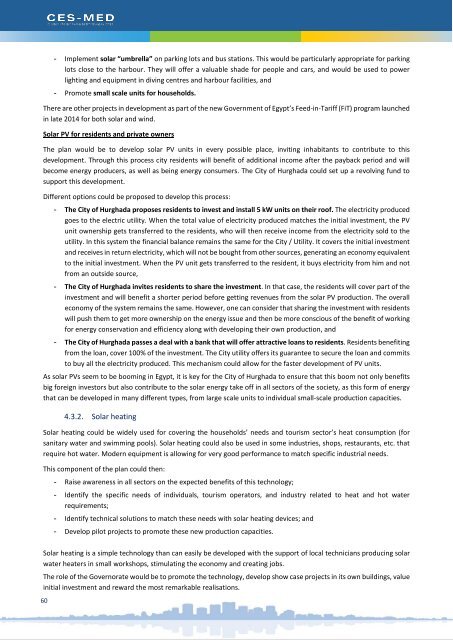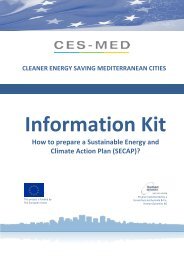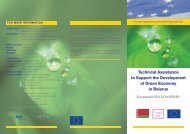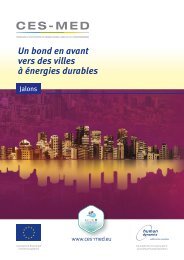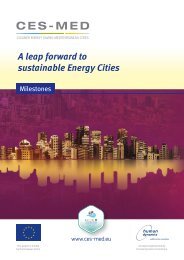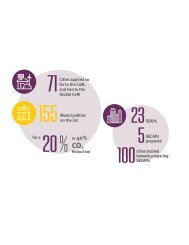020318_Hurghada SECAP_FINAL
Create successful ePaper yourself
Turn your PDF publications into a flip-book with our unique Google optimized e-Paper software.
- Implement solar “umbrella” on parking lots and bus stations. This would be particularly appropriate for parking<br />
lots close to the harbour. They will offer a valuable shade for people and cars, and would be used to power<br />
lighting and equipment in diving centres and harbour facilities, and<br />
- Promote small scale units for households.<br />
There are other projects in development as part of the new Government of Egypt’s Feed-in-Tariff (FiT) program launched<br />
in late 2014 for both solar and wind.<br />
Solar PV for residents and private owners<br />
The plan would be to develop solar PV units in every possible place, inviting inhabitants to contribute to this<br />
development. Through this process city residents will benefit of additional income after the payback period and will<br />
become energy producers, as well as being energy consumers. The City of <strong>Hurghada</strong> could set up a revolving fund to<br />
support this development.<br />
Different options could be proposed to develop this process:<br />
- The City of <strong>Hurghada</strong> proposes residents to invest and install 5 kW units on their roof. The electricity produced<br />
goes to the electric utility. When the total value of electricity produced matches the initial investment, the PV<br />
unit ownership gets transferred to the residents, who will then receive income from the electricity sold to the<br />
utility. In this system the financial balance remains the same for the City / Utility. It covers the initial investment<br />
and receives in return electricity, which will not be bought from other sources, generating an economy equivalent<br />
to the initial investment. When the PV unit gets transferred to the resident, it buys electricity from him and not<br />
from an outside source,<br />
- The City of <strong>Hurghada</strong> invites residents to share the investment. In that case, the residents will cover part of the<br />
investment and will benefit a shorter period before getting revenues from the solar PV production. The overall<br />
economy of the system remains the same. However, one can consider that sharing the investment with residents<br />
will push them to get more ownership on the energy issue and then be more conscious of the benefit of working<br />
for energy conservation and efficiency along with developing their own production, and<br />
- The City of <strong>Hurghada</strong> passes a deal with a bank that will offer attractive loans to residents. Residents benefiting<br />
from the loan, cover 100% of the investment. The City utility offers its guarantee to secure the loan and commits<br />
to buy all the electricity produced. This mechanism could allow for the faster development of PV units.<br />
As solar PVs seem to be booming in Egypt, it is key for the City of <strong>Hurghada</strong> to ensure that this boom not only benefits<br />
big foreign investors but also contribute to the solar energy take off in all sectors of the society, as this form of energy<br />
that can be developed in many different types, from large scale units to individual small-scale production capacities.<br />
4.3.2. Solar heating<br />
Solar heating could be widely used for covering the households’ needs and tourism sector’s heat consumption (for<br />
sanitary water and swimming pools). Solar heating could also be used in some industries, shops, restaurants, etc. that<br />
require hot water. Modern equipment is allowing for very good performance to match specific industrial needs.<br />
This component of the plan could then:<br />
- Raise awareness in all sectors on the expected benefits of this technology;<br />
- Identify the specific needs of individuals, tourism operators, and industry related to heat and hot water<br />
requirements;<br />
- Identify technical solutions to match these needs with solar heating devices; and<br />
- Develop pilot projects to promote these new production capacities.<br />
Solar heating is a simple technology than can easily be developed with the support of local technicians producing solar<br />
water heaters in small workshops, stimulating the economy and creating jobs.<br />
The role of the Governorate would be to promote the technology, develop show case projects in its own buildings, value<br />
initial investment and reward the most remarkable realisations.<br />
60


